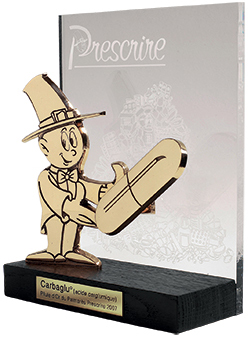
Products evaluated during the previous year in the New Products section of our French edition are eligible for the Prescrire Awards for new drugs and indications.
These awards complement the annual review published at the beginning of each year in our French edition and a review of new drugs and indications in 2014 to be published in the April issue of Prescrire International.
|

Pilule d'Or/Golden Pill 2014
The "Pilule d'Or" ("Golden Pill") has been granted since 1981 to drugs that constitute a major therapeutic advance in a field in which no treatment was previously available.
|
| ORPHACOL° (cholic acid) |
Cell Therapies Research & Services (CTRS)
|
Given the seriousness of certain hereditary bile acid deficiencies, which are usually fatal during childhood, cholic acid is a major advance that prolongs survival considerably, provided treatment is initiated early (Prescrire Int n° 157) |
| For the list of all the Pilule d'Or (Golden Pill) awards given out 1981-2014, click > HERE |
|
 Honours List 2014 Honours List 2014
Drugs are included on the "Honours List" because they represent a clear advance for some patients compared with existing therapeutic options, albeit with limitations.
|
GLIVEC°
(imatinib) |
Novartis Pharma |
Acute lymphoblastic leukaemia in children (Prescrire Int n° 157) |
MALACEF° (intravenous artesunate)
|
MA holder in China: Guilin Pharmaceutical, importer and distributer in France: ACE Pharmaceuticals |
Severe malaria (Prescrire Int n° 154) |
| SOVALDI° (sofosbuvir) |
Gilead Sciences |
Hepatitis C (Prescrire Int n° 156) |
|

Noteworthy
Drugs deemed "Noteworthy" provide a modest improvement in patient care.
|
| PHEBURANE° (sodium phenylbutyrate coated granules) |
Lucane Pharma |
Urea cycle disorders
(Prescrire Int n° 157) |
About the 2014 Drug Awards
Each month, the Prescrire Editorial Staff presents systematic comparative analyses of available data on drugs newly approved in France, and on new therapeutic indications granted for existing drugs. The goal is to help the reader distinguish, among the plethora of lavishly promoted commercial products, those medications worth adding to their drug list or worth using instead of existing products, as well as products to be avoided.
This evaluation is based on rigorous procedures that include a thorough literature search, input from a group of reviewers (specific to each project), and various quality controls to verify that the text is consistent with the data in the references. Full details > HERE
Total independence
This work is carried out by the Prescrire Editorial Staff in total independence, free from any industry or institutional influence. Prescrire is financed exclusively by its subscribers. Neither the French nor the English edition carries any paid advertising, nor do we receive grants or subsidies of any kind (see our annual financial report in each June issue of Prescrire International). Full details > HERE
At the end of each year, the Prescrire Drug Awards are based on the review articles published that year in the French edition, and take into account any new data available since the initial articles were published.
These awards honour drugs that constitute a therapeutic advance, in that they offer better efficacy, fewer or less severe adverse effects (for similar efficacy), or safer or easier administration.
The rules governing the Prescrire Awards are available (in French) > HERE
2014: a good vintage
Five drug awards have been earned this year: one Golden Pill, which has not happened in six years, three products have been included on the Honours List, and one was deemed "Noteworthy".
Three of the drugs honoured this year (Orphacol°, Glivec° and Pheburane°) are treatments for rare diseases.
Golden Pill for Orphacol° (cholic acid)
Cholic acid (Orphacol°) constitutes a major advance for patients with one of the rare hereditary defects of primary bile acid synthesis, which are usually fatal during childhood. It prolongs survival considerably, provided treatment is initiated early. This drug has been in use in France for some time, but only through a temporary (compassionate) authorisation programme. It has been awarded a Golden Pill because its development and European marketing authorisation (MA) represent an important event for patients.
Three drugs on the Honours List and one Noteworthy
In children with a rare form of acute lymphoblastic leukaemia, with Philadelphia chromosome, the tyrosine kinase inhibitor imatinib (Glivec°) prolongs survival considerably. However, when Glivec° was authorised for this indication, it was not marketed in a dosage form appropriate for children.
Severe malaria is rare in France, but a leading cause of death worldwide. Intravenous artesunate (Malacef°) has become the standard treatment for severe malaria. It is available in France through a temporary authorisation programme involving collection of data on the treated population. As of end of 2014, no companies have submitted a MA application to the European Medicines Agency for this drug.
In many patients with chronic hepatitis C in whom pharmacological treatment is justified, the NS5B polymerase inhibitor sofosbuvir (Sovaldi°) is an antiviral that is at least as effective as viral protease inhibitors and enables a shorter treatment duration, thus reducing the overall toxicity of antiviral therapy. Yet there are uncertainties about its long-term efficacy and its adverse effects. Its price is exorbitant, bearing little relation to research and production costs, with dangerous implications for any system of universal health care.
For patients with one of the rare urea cycle disorders, sodium phenylbutyrate prolongs survival but has only modest benefits on psychomotor retardation. The coating on Pheburane° sodium phenylbutyrate granules is an advance because it masks the drug's unpleasant taste, which caused nausea and vomiting and compromised treatment adherence.
Is this year an exception or the start of a new trend?
It has been twenty years since so many drugs received Prescrire Drug Awards. Let's hope, for patients' sake, that this is the start of a lasting trend rather than a one-off occurrence.
©Prescrire February 2015
"The Prescrire Awards 2014" Prescrire Int 2015; 24 (158): 74-79. (pdf, free)
